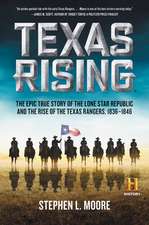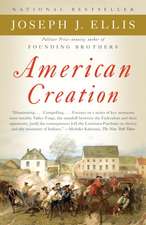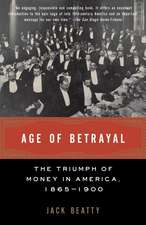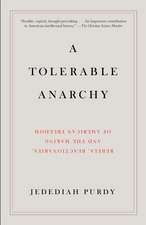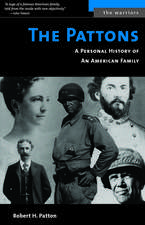Patriot Pirates: The Privateer War for Freedom and Fortune in the American Revolution
Autor Robert H. Pattonen Limba Engleză Paperback – 31 mai 2009
Preț: 115.83 lei
Nou
Puncte Express: 174
Preț estimativ în valută:
22.17€ • 23.06$ • 18.58£
22.17€ • 23.06$ • 18.58£
Carte disponibilă
Livrare economică 20 februarie-06 martie
Preluare comenzi: 021 569.72.76
Specificații
ISBN-13: 9780307390554
ISBN-10: 0307390551
Pagini: 291
Ilustrații: 17 ILLUSTRATIONS
Dimensiuni: 130 x 206 x 17 mm
Greutate: 0.32 kg
Editura: Vintage Books USA
ISBN-10: 0307390551
Pagini: 291
Ilustrații: 17 ILLUSTRATIONS
Dimensiuni: 130 x 206 x 17 mm
Greutate: 0.32 kg
Editura: Vintage Books USA
Extras
PROLOGUE
Beset by a sudden squall in April 1775, a small British sloop, “very much torn to pieces by the gale of wind,” ducked into the sheltered bay off Beverly, Massachusetts, sometime after dark. It proved a false refuge, for the next morning two fishermen armed with pistols rowed out from the town wharf and claimed the beleaguered vessel as a war prize. After its crew of five men and two women surrendered without protest, the event went down as Beverly’s first capture of enemy loot–a single barrel each of flour, tobacco, rum, and pork.
Citizens excitedly kept watch on the bay in anticipation of more prey. Their vigilance was rewarded when His Majesty’s ship Nautilus ran aground while pursuing Hannah, an armed schooner recently commissioned by George Washington to hijack enemy transports supplying British troops in Boston, twenty-five miles south.
People flocked to the beach and began shooting at the stranded warship “very badly many times” with household muskets and a motley battery of antiquated cannon. “’Tis luck they fired so high,” Nautilus’s captain wrote afterward. Even so, one of his seamen lost a leg in the barrage and another was killed before the vessel rose off the sand on the incoming tide and fled to open water. Ashore, men had body parts “blowed off” by misfires of gunpowder and by accidentally shooting one another.
The mad fervor of the region’s saltwater colonials was well known to British authorities. There’d been incidents of government supply crews abandoning ship down one side as marauders in converted fishing boats clambered up the other side wielding clubs and cutlasses. In response, the Royal Navy’s commander in Boston, Admiral Samuel Graves, had directed his captains to “burn, sink, and destroy” suspicious vessels and to “lay waste and destroy every town or place from whence pirates are fitted out.”
The spiraling violence made everyone cry foul. Americans cursed “Graves and his harpies.” The British retorted that “a thief might with as much truth and reason complain of the cruelty of a man who should knock him down for robbing him!”
British leaders told themselves “those vermin” would be easily crushed, “especially when their loose discipline is considered.” But an unsigned letter from a naval officer stationed in Boston and published that winter in a London newspaper gave a darker assessment. “They are bold enough to dare and do anything,” he wrote of the American sea raiders. “Whatever other vices they may have, cowardice is not one of them.”
Beset by a sudden squall in April 1775, a small British sloop, “very much torn to pieces by the gale of wind,” ducked into the sheltered bay off Beverly, Massachusetts, sometime after dark. It proved a false refuge, for the next morning two fishermen armed with pistols rowed out from the town wharf and claimed the beleaguered vessel as a war prize. After its crew of five men and two women surrendered without protest, the event went down as Beverly’s first capture of enemy loot–a single barrel each of flour, tobacco, rum, and pork.
Citizens excitedly kept watch on the bay in anticipation of more prey. Their vigilance was rewarded when His Majesty’s ship Nautilus ran aground while pursuing Hannah, an armed schooner recently commissioned by George Washington to hijack enemy transports supplying British troops in Boston, twenty-five miles south.
People flocked to the beach and began shooting at the stranded warship “very badly many times” with household muskets and a motley battery of antiquated cannon. “’Tis luck they fired so high,” Nautilus’s captain wrote afterward. Even so, one of his seamen lost a leg in the barrage and another was killed before the vessel rose off the sand on the incoming tide and fled to open water. Ashore, men had body parts “blowed off” by misfires of gunpowder and by accidentally shooting one another.
The mad fervor of the region’s saltwater colonials was well known to British authorities. There’d been incidents of government supply crews abandoning ship down one side as marauders in converted fishing boats clambered up the other side wielding clubs and cutlasses. In response, the Royal Navy’s commander in Boston, Admiral Samuel Graves, had directed his captains to “burn, sink, and destroy” suspicious vessels and to “lay waste and destroy every town or place from whence pirates are fitted out.”
The spiraling violence made everyone cry foul. Americans cursed “Graves and his harpies.” The British retorted that “a thief might with as much truth and reason complain of the cruelty of a man who should knock him down for robbing him!”
British leaders told themselves “those vermin” would be easily crushed, “especially when their loose discipline is considered.” But an unsigned letter from a naval officer stationed in Boston and published that winter in a London newspaper gave a darker assessment. “They are bold enough to dare and do anything,” he wrote of the American sea raiders. “Whatever other vices they may have, cowardice is not one of them.”
Recenzii
“Entertaining and enlightening. . . . [Patton] has dug deep into Revolutionary War-era records and writes with verve.”–The Washington Post Book World“The British had always accused us of being pirates and thieves. Robert Patton’s fascinating account of privateering during the American Revolution nicely proves their point.”–Winston Groom“Wonderfully told.” –The Hartford Courant“Intriguing. . . . Lively and instructive. . . . Patriot Pirates is not ‘revisionist’ or ‘alternative’ history. What it offers is neglected history, the study of a crucial theater of the Revolution that has been overlooked, perhaps because it lacks the mythic cutouts we like to champion on the Fourth of July.”–The Washington Times“Having, as an Englishman, been brought up on Hornblower and Nelson, I was fascinated to read Robert Patton’s Patriot Pirates and to discover what I never knew about the American Hornblowers–the privateers of the Revolutionary War and their extraordinary adventures. For all those who love history and the sea, this is soul-stirring stuff, as good as reading a Patrick O’Brian novel, except that every word is true.”–Michael Korda, author of Ulysses S. Grant and Ike“A fascinating account that would make an exciting television series. . . . [Patton] has done great work to bring this story to life.”–Proceedings Magazine (U.S. Naval Institute)“Patton gives an absorbing exhumation of an undersung subject that will be of particular interest to Revolution buffs.”–Publishers Weekly“In this deeply considered book, based on overlooked primary sources, Robert H. Patton illuminates the raucous, illicit origins of our American democracy. The privateers of the Revolution operated in a twilit world of idealism and greed, launching the new nation on the double edge that would thereafter define it. Many familiar names–the Browns of Providence, the Cabots and Derbys of Salem, the Binghams and Franklins of Philadelphia–appear here in unfamiliar, less admirable ways. With neither rancor nor illusions, Patriot Pirates reminds us again of the mystery and unpredictability of true history.”–Stephen Fox, author of Wolf of the Deep: Raphael Semmes and the Notorious Confederate Raider CSS Alabama“A fascinating case study in free enterprise. . . . Patton’s book is an eye-opener”–The Georgetown Record (Massachusetts)“A well-written examination of an obscure aspect of American military history.”–Booklist“Illuminating. . . . A pleasing mixture of high-seas adventure and shrewd analysis.”–Kirkus Reviews
Notă biografică
Robert H. Patton graduated from Brown University and Northwestern University. He is the author of The Pattons: A Personal History of an American Family. Patton lives with his wife and family in Darien, Connecticut.


